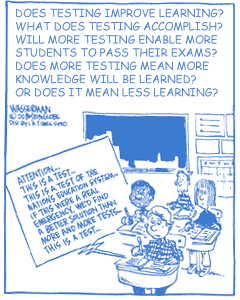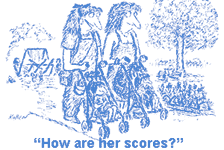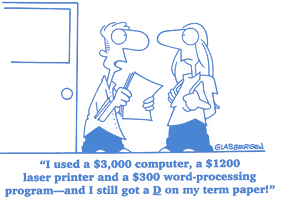 Exams, tests and grading. Exams, tests and grading.
 Sarah Boseley Sarah Boseley

 
Today, the very fabric of our society depends on
schools and our system of education for the imparting of knowledge to
its people. This in turn enables the society to function. However,
schools and the system of education are entwined together with tests,
exams and grading. These tests, exams and grading, have become such a
part of the education system and the function of schools, that it is
difficult to imagine learning without them. For this site this creates
a dilemma. On the one hand, we do not wish to abandon schools as a
possible source of learning, but on the other, we wish to maintain that
tests, exams and grading are not necessary for learning to take place.
Learning, as explained elsewhere in this site, is
something each person must do themselves. It can and does happen
anywhere, not just at schools. This site will endeavor to present 12
keys to learning which are derived from the great thinkers in
learning and are intended to help ordinary people learn more
efficiently and easily. However, if these keys are approached with the
idea that they need to be combined within a system that is mired by
tests, it is feared their usefulness will be severely hampered and
perhaps they will be modified so much that they become unworkable.
Great Thinkers.
It is perhaps pertinent, to point out here, that
many of the world's great thinkers had difficulty at school, and were
often unable to pass exams necessary to move them to what we would
consider to be their true station in life. These are the people who
expand the frontier of knowledge and there is a slight possibility
exams can prevent such people making their unique contribution. Let us
consider the lives of two of these great thinkers, Albert Einstein and
Evariste Galois. Einstein was chosen because everybody knows him.
Einstein is so iconic that his name has become synonymous with genius.
Only Leonardo Da Vinci could have claimed such a thing previously. It
is interesting to note, therefore, that Einstein was not very good with
some school work and had little patience with exams and tests. This was
so much so, that he had to start his working life as a patent clerk and
not as a working scientist.
 Einstein &
Galois. Einstein &
Galois. 
Einstein of course, became famous after some of
his important scientific papers had been published. However, such is
not the case with Galois. He never achieved fame or any position of
importance nor were many of his peers even aware of his work. Yet he
was arguably the greatest mathematician of all time. Galois' story is a
cautionary tale for those who think exams are important. He was failed
over and over again and was never granted entrance to the kind of
college that could have promoted his work. His work was set aside and
lost. He was not able to mix with his peers and most of his work was
never published while he was alive. Most of what we know of his work,
comes from frantic scribblings on the eve of a stupid duel, where he
was fatally wounded in his twenty first year of life.
We have many reasons for rejecting tests, not the
least of which may be that they are time wasting and even damaging to
learning. The damage that testing and exams can do was probably best
expressed by Jean Piaget in
"To Understand is to Invent" as follows.
 Piaget says: Piaget says:
Everything has been said
about the value of scholastic examinations, and yet this veritable
plague on education at all levels continues to poison --such
terminology is not too strong here-- normal relations between the
teacher and the student by jeopardizing for both parties the joy in
work as well as mutual confidence. The two basic faults of the
examination are that generally it does not give objective results, and
it becomes, fatally, an end in itself (for even admission examinations
are always, first of all, final examinations: the admission examination
to high school becomes an end for primary education, etc.) The School
examination is not objective, first because it contains an element of
chance, but mostly because it depends on memory more than on the
constructive capabilities of the student (as if he were condemned never
to be able to use his books once he was out of school!). Anyone can
confirm how little the grading that results from examination
corresponds to the final useful work of people in life. The school
examination becomes an end in itself because it dominates the teacher's
concerns, instead of fostering his natural role as one who stimulates consciences and
minds, and he directs all the work of the students toward the
artificial result which is success in the tests, instead of calling
attention to the student's real activities and personality."
Testing is so entrenched in our society, our
culture, that it may come as a surprise to learn, that it is commonly
believed by a large section of the academic community to be completely
unnecessary. Everybody knows the arguments in favor of exams, but few
seem to be aware of the arguments against them. Whether they are called
examinations or testing or grading they seem to serve little purpose
that can be demonstrated.
Although there are many other things wrong with
tests, the single most damaging thing about tests is the fact that they
are graded. It is grading that sets us apart from one another. It is
grading that tells us that some of us are better or worse than others
and by how much. As motivation goes this means that the higher rated
will be motivated to continue, while the lower rated will not, and may
in fact, be motivated not to try. The real problem with grades,
however, is that it moves children away from learning what they are
interested in, in favor of working at that which will get them the best
grades.
 
 Grading. Grading.

There are many criticisms of grading but people
who are interested to learn more about the harm grades and grading can
do are advised to read
"Wad-Ja-Get?" by Kirschenbaum Simon and Napier. This book
shows how grading encourages cheating, brown nosing or grade grubbing.
It shows how teachers are unable to give consistent marks, even when
given the same paper only months later, and how the variation with a
different teacher grading the same paper can be as much as 25%. This
book is fully supported with scientific studies conduced by a wide
range of institutions. It also provides thought provoking arguments.
Here are some sample excerpts from that book.
"So it came to pass that
imperfectly educated teachers, using imperfect measures and imperfect
criteria, began to grade students on subject matters that may or may
not have had any obvious significance in the life of the student.
Success was no longer measured in competitive debate, or the sports
arena or on the battle field, or on the job. It was determined by the
whim of the teacher in the classroom. At one time in history, it was the
teacher
who was graded on the basis of the performance of his students. If a
teacher's students succeeded in the competition of daily living, he was
assured of more pupils and also a flourishing practice. But if his
pupils consistently failed, he would not make it as a teacher and would
probably have to get another job.

"My major objection to the
form of grading used while I was at school is that the grades usually
became the sought after goal rather than merely symbolizing what had
been learned."
-
"Grades are unscientific,
subjective and seldom relative to educational objectives."
-
"They are misleading and
focus on only one aspect of the child."
-
"They promote superficial,
spurious and insincere scholarship."
-
"They lead to uncreative
teaching."
-
"They form a barrier between
students and teachers."
-
"Pupils perform for the
grade and, as a result, show less initiative and independence."
-
"Grades tend to divide
students into recognizable groups, reflecting inferior and superior
qualities, thus often becoming the basis for social relationships."
-
"They establish a
competitive system, with grades as the basis for achievement."
However, it is not just grading that is
detrimental to learning but the whole idea of testing. The primary
argument for tests is the idea that students need to test themselves or
be tested to see if they have understood something. This site rejects
this. It is the whole testing structure that confuses children about
understanding. It creates in them the idea that if they pass a test
getting the answers right that they actually understand something.
Before they were exposed to testing they were well aware when they
understood something and when they did not. Other arguments for
testing are that memory is improved by testing and that teachers need
to be informed by tests of the progress
of students. This site holds that it is self-evident that teachers
would be much better informed about students by going around and
interacting with each student.
The only real arguments for tests (of this sort)
are:
-
That tests are
necessary to indicate professional competence in various professions
(such as doctors) so that the public has some minimal protection when
using their services.
-
That tests provide feedback to the student about
his/her progress in learning. This is about skill, it is certainly true
of physical
skills but also true about mental skills (manipulation of ideas rather
than the understanding of them). This site would suggest, however, that
this is because tests often provide a forum for constructive criticism,
and that constructive criticism alone would provide far better feedback.
-
That tests improve the recall of already learned
information. There is no getting around it, testing does
improve the recall of already learned facts and theories. This is
probably the
only really good reason to increase tests rather than decrease them.
Testing forces students to try and recall data rather than simply look
it up. It has been shown in studies that studying by rereading or
looking up information is not nearly as effective at improving recall
as
is trying to recall the information first and then looking up the
answer. Obviously self testing or simply trying to recall information
before looking it up would serve students better in this regard.
Many educators and psychologists agree that there
may be no need for any testing in the actual learning process and that
it is probably harmful to learning. What then could be a possible use
of testing?
Society currently requires that testing be used
for separating students into vaguely similar groups for the benefit of
teachers. These teachers are required to present something that can be
absorbed by everybody in their class at the same time. If we dispense
with teaching everybody in a class the same thing at the same time this
need simply evaporates. (These groupings, once you have been placed in
them are nearly impossible to escape from. Whether they are
intelligence tests or the use of examination tests for streaming, they
place students in labeled boxes, where sufficient improvement to
provide escape is almost unthinkable. This was clearly shown in
"Pygmalion in the Classroom" by Rosenthal and Jacobson.)

Of course, the examination at the end of each year
is the test that schools and administrators feel is most indispensable.
But is it? Why do we need to have a group of similar age all learning
the same things? If we do not then students have the choice to be far
ahead in one subject and way behind in another. They can be learning
with some much younger than themselves and some much older than
themselves.
Examinations are
not really needed for the colleges and universities that should have
their own entrance qualifications, and which should not include exams.
If colleges wish to determine if students are clever enough or creative
enough to be worthy of being selected for their college they could set
their own entrance exams, and of course the SATs in America already
perform just this function. But then why do the colleges need to
determine if someone is good enough to go there? Surely wanting to go
there should be enough, and if the school isn't big enough then build
it bigger as you would a business. In the end the only exams that
nearly everybody agrees make any sort of sense are the college and
university degrees. But what are degrees used for? In the end it seems,
that exams are useful only for businesses looking for new workers and
the acceptance that one is qualified in a profession such as a doctor.
But is this so? Surely businesses and professions
would also be far better off in devising their own entrance exams,
rather than relying on exams from other sources like schools, where
there are a great variety of standards. For businesses the learning
done in school, for the most part, relates to information that is
completely irrelevant to their business or profession. So finally we
come to entrance exams which still seem to have some claim to being
useful in schools. This site suggests, however, that this is mainly a
device for keeping out students that the administrators feel would be
disruptive or just not of the right sort. While this can not be
justified on moral grounds, it is an understandable human prejudice.
Certainly teachers get little pleasure from tests.
In the current system teachers spend a huge portion of their work time
marking, correcting and grading papers. This activity, even more than
general paper work, is the single greatest time waster for teachers.
For many teachers it is as utterly boring and depressing as it is for
the students. If teachers could be freed from this activity, they would
have maybe 50% more time to spend actually helping students to learn.
 
Exams or tests are supposed to enable us to become
aware of what we do not know or hold incorrectly to be true. Exams or
tests do not however, enable us to become aware of such things. What we
hold to be true, is only changed by understanding or the accommodation
of what we already know to fit with this new knowledge. Exams generally
do not uncover what we do not know, but instead, what others think we
should know. This implies that there is a body of knowledge that we
should know, and that we are somehow inadequate, if we do not know it.
This site holds that it is not for others to judge what we should know.

Important.
What is important, is what
we do know, what we can know, and our desire to know it.
The effects of evaluation on learning.
Although
there is still some debate about the scientific effects of evaluation,
I think it is now generally accepted in scientific circles that
evaluation generally has a negative effect on learning activities.
 Scientific studies
of the effects of evaluation on learning. Scientific studies
of the effects of evaluation on learning.
Mark
Lepper was the first to suggest that a sense of personal control might
be essential motivation and thus to evaluation.
Teresa
Amabile, Edward Deci, Richard Ryan, Mark Lepper and many others, have
gradually through many different and diverse experiments, over
a period of about 30 years, pieced together a picture that
clearly and scientifically, shows the disastrous effects that
evaluation can have on learning. Although nobody seems to have been
testing the effects of evaluation specifically on learning, such
concepts as creativity studied by Amabile, intrinsic motivation studied
by Deci & Ryan, anxiety studies by Moshe Zeidner, cover a wide
range of activities including most areas of knowledge that could be
called learning.
 The effects of
evaluation on intrinsic motivation. The effects of
evaluation on intrinsic motivation. 
Edward
Deci and Richard Ryan have devised a whole new theory of motivation in
an effort to initially explain the detrimental effects that that they
found extrinsic rewards to have on intrinsic motivation. "Self-Determination Theory"
as their theory is named, addresses the interplay of three basic needs
determined as "Autonomy", "Relatedness" and "Competence". Although this
theory is less concerned with evaluation as being detrimental to
learning and more concerned as to how it can be useful for and in
consonance with learning it has produced findings that are very
significant. The results of their findings and the results of others
such as White which they used as a basis for their theory are presented
in their book
"Intrinsic Motivation and self-Determination in Human Behavior"
as follows:
- Negative effect.
Actual evaluation generally decreases intrinsic
motivation. In other words people are less intrinsically motivated to
engage in the same activity after having been evaluated. Also that this
was true not just for negative evaluation but also for positive
evaluation.
- Negative effect.
Evaluation that is more controlling decreases intrinsic motivation.
- Negative effect.
Evaluation that is less informational
decreases intrinsic motivation.
- Positive effect.
Evaluation that is less
controlling and provides a
considerable amount of choice can increase intrinsic motivation.
- Positive effect.
Evaluation that is more
informational about the
work, whether complementary or critical, can increase intrinsic
motivation.
Deci
and Ryan explain: "In so far as people's work is being
critically evaluated by an external agent, it is possible that people
will lose a sense of self-determination and experience a shift in the
perceived locus of causality. Evaluations are the basis for determining
whether people are complying with external demands, so evaluations
themselves are likely to connote external control and therefore to
undermine intrinsic motivation."
 The effects of evaluation on
creativity. The effects of evaluation on
creativity.
Teresa
Amabile and her colleagues did studies of the effect of evaluation on
creativity. They found their results to be consistent for both children
and adults and for both verbal creativity and artistic creativity. The
results of their findings in both real world observation and
experimental studies from her book
"Creativity in Context" are presented here as follows:
- Expected evaluation generally reduces creative
performance. In other words people do less creative work if they expect
to be evaluated in any way by somebody else.
- Expected evaluation of creative performance
reduces further creative performance.
- Actual
evaluation (positive or negative) that is perceived to be informational
tends to increase creativity.
- Actual
evaluation (positive or negative) that is perceived to be controlling
tends to reduce creativity.
- The
salience of these two perceived aspects (control & information)
provide a continuum along which creativity may
increase or reduce or may cancel each other out.
- Verbal
positive evaluation generally increases creativity, especially if it is
informative about specific aspects of the work.
- There is an implied possibility of evaluation in
working in the presence of others which has a negative effect on
creativity. So that people working alone tend to be more creative than
those working in the presence of others.
- The negative effect of evaluation on shy subjects
was substantially more than on other subjects.
- Low
skilled subjects perform creatively better after positive evaluation.
- High
skilled subjects perform creatively worse after positive evaluation.
- Creativity tends to be supported by evaluation
that is work focused and constructive (even when it is actually
negative) if it provides information about performance improvement.
- Creativity tends to be supported by evaluation if
it conveys positive recognition of competence and valued work.
Basically
what Amabile has discovered through research and experiment is that is
that while evaluation is generally detrimental to creativity it can be
supportive of creativity if it is work focused and constructive. The
single exception to this is those who are unskilled and this Amabile
theorizes is because the prospect of negative evaluation co-occurs with
low levels of skill. Thus creativity tends to be undermined by
evaluation that conveys incompetence or threatens self determination.
 The effects
of evaluation on competence. The effects
of evaluation on competence.
Carol
Dweck and Andrew Elliot have compiled and edited a compendium on
competence called
"The Handbook of Competence and Motivation" in which there is
an examination of the effects of evaluation on competence by Moshe
Zeidner and Gerald Matthews. These studies, although more guarded, also
report that test anxiety has some detrimental effects on competence as
follows:
- Evaluation has various unfavorable competence
outcomes including poor cognitive performance, scholastic
underachievement, psychological distress and ill health. Consequently
evaluation probably prevents large numbers of highly competent people
from being admitted to colleges, universities, and other educational
training programs. This results in people wasting their lives and the
contribution they could have made to society being lost.
- Evaluation in the form of test anxiety reduces
competence in self evaluation which produces further anxiety and loss
of competence in other areas.
- A
considerable correlation has been found between people who suffer from test anxiety and those
who have metal blocks or are technophobes.
- Various
groups are prone to test anxiety. Such people have entered vicious
circles that maintain or intensify test anxiety which ensures
competence reduction.
- Examinees
who are deficient in study and test taking skills. Lack of skill
ensures increase in test anxiety.
- Examinees who are blocked
or who are experiencing retrieval problems. Blockages and memory
problems ensure further anxiety.
- Examinees
who are failure avoiding. Failure avoiders try hard and put in great
effort but a single failure produces such anxiety that they tend to
fail more and more. Thus it follows that anxiety builds and competency
weakens.
- Examinees
who are unable to take responsibility for their
own actions. Such people exhibit an excessive concern for what others
think. They begin to avoid test situations and the study that is normal
in preparation for them. This ensures that test anxiety will increase.
This can lead to other self sabotaging activities such as
procrastination and self handicapping in order to lower their own and
other people's expectations. These self defeating strategies further
increase test anxiety.
- Examinees
who are perfectionists or over-strivers. Such people expect too much
from themselves and thus set competence goals at an unrealistic level
ensuring failure, increased anxiety and perceived lack of competence.
- Test
anxiety interferes with cognitive performance both in the laboratory
and in true to life experiences in the schools and colleges.
- Negative
feedback is especially damaging to people who are already test anxious.
- People
who were prone to test anxiety tended to be more self
centered and self critical to the point of often emitting personalized
self derogatory responses.
- A meta study by Hembree showed that test anxiety
correlated negatively with a wide array of school achievement
including:
- Reduction in grades in all
the various subjects included in the test.
- Problem
solving reduction.
- Intelligence
Quotient (IQ) reduction.
- Fluid
intelligence and crystallized intelligence reduction.
- Learning
reduction.
- Memory
reduction.
- Skill
performance reduction.
- Negative
self concept, self esteem and pessimism correlate with low academic
achievement, and low accomplishment.
- Positive
self concept, self esteem, and optimism correlate with high academic
achievement, and high accomplishment.
- Eysenic
theorized that high anxiety (including test anxiety) leads to scanning
the environment for threats thus causing distraction from focus and
attention impairment. One might assume that no anxiety would therefore
lead to focus concentration and scanning for opportunity.
Evaluation that increases and enhances.
While evaluation has been generally found to have
a harmful effect on intrinsic motivation, creativity and general
competence, it is clear from the above findings that evaluation can be,
if performed correctly, enhancing. It is in fact enhancing to the very
same human qualities (intrinsic motivation, creativity, and
competence). The above findings have lead many people concerned with
learning including the writer to the following conclusions about how to
make evaluation a positive experience that will enhance intrinsic
motivation, enhance creativity and enhance competence. Those wishing to
enhance or increase these essential human qualities would be advised to
consider the following directions in performing evaluation:
- Evaluation is most functional in enhancing
humans when it is intimate and shows interest and caring. Evaluation is
least functional when it is indifferent, unconcerned and uninterested.
- Evaluation is at its most enhancing when it is
informational or supplies specific feedback about the work being
evaluated. Evaluation is at its most sabotaging when it is controlling or is perceived
as an attack on the person.
- Evaluation is best given in a positive feedback
form if the person is anxious or has low confidence in their own
competence or creativity.
People who are not anxious and who are confident in their own
competence and creativity can handle a good deal of negative feedback
about their work as they are aware that only negative feedback i.e.
criticism can truly enable the changes necessary for improvement.
- Positive self (theories) concept, self esteem
and general optimism all mediate to prevent the negative effects of
evaluation.
Exams, tests and other forms of evaluation in
schools, perhaps by their very nature tend to be indifferent and
uninterested. It's not enough to inform students they are wrong.
Evaluation is only helpful when it supplies feedback about what the
student did wrong, where the student went off course, how the student
fell into error, and makes some suggestion as to what the student could
do in the future. Simply marking something wrong gives very little
informational feedback. There are many things about tests at school
that are clearly harmful to human learning and one of the worst is how
they are designed to control a student's passage through life. Some
teachers who are sensitive to student's needs, do provide choice and
informational feedback, but exams and tests as a rule provide very
little opportunity for this. Worst of all, school tests and exams are
constantly eroding student's self (theories) concepts, self esteem and
their optimism. This overall reduction in intrinsic motivation,
creativity and competence leads to self defeating strategies, which
minimize effort and thus perpetuate a vicious cycle. It seems doubtful
that exams and tests in schools could ever be framed in a form that
could be enhancing to intrinsic motivation, creativity or competence
and thus be enhancing to learning.
In summary.
It is the view of this site
that exams and tests
have only three acceptable functions.
-
One is to provide a standard where
members of a vocation or profession can be accepted as being expert.
This is a kind of consumer protection where quacks, impostors and other
would be professionals are almost eliminated or minimized for the
protection of the public. We are all aware that when we call a plumber
or a doctor we do not always get the best advice or the best job, but
it is difficult to imagine a world where just anybody could call
themselves a doctor or a plumber. The tests that doctors and plumbers
have to pass in order to be allowed to so advertise themselves provides
the public with at least some minimal protection.
-
Two is as a means of feedback for
the learner as to how he can judge himself against his peers and in
terms of creativity or competence. If considering entering a vocation
or profession that requires the demonstration of knowledge commensurate
with some standard, a learner may wish to find out first, if he has
acquired sufficient knowledge. This may be so as to not waste the time
of those who check if learners have passed the standard. Learners may
also just wish to test themselves first. Learners may simply wish to be
more aware of how their own knowledge compares with others and thus
wish to test themselves when no standard is required. Learners
ultimately need informational feedback so that they can learn from the
experience and skills of others. They need this to enable their own
improvement and change.
-
Three is as a way of improving the recall of the
specific memories of the information being tested. Although the same
memory improvement can be achieved by means of self testing and simply
trying to remember specific information before looking it up it must be
acknowledged that improving recall is a legitimate reason for having
tests.
What exams do and do not do.
- Exams or tests do not supply us with
the skills needed to apply our knowledge in the outside world.
- Exams or tests do not give us the confidence we
need to use our knowledge in the world of professions and work.
- Exams do not spark our interest or motivate us
in any way to learn or to in fact become qualified.
- Exams can only provide a piece of paper that
says we are qualified in some profession or work skill (which may or
may not be true).
Ultimately, however, we will be judged in the
performance of actual work. Surely it is preferable to be actually able
to do the work, than to have a piece of paper that says you can do it.
|






 Exams, tests and grading.
Exams, tests and grading. Sarah Boseley
Sarah Boseley
 Grading.
Grading.






 Scientific studies
of the effects of evaluation on learning.
Scientific studies
of the effects of evaluation on learning. The effects of
evaluation on intrinsic motivation.
The effects of
evaluation on intrinsic motivation. 
 The effects of evaluation on
creativity.
The effects of evaluation on
creativity. The effects
of evaluation on competence.
The effects
of evaluation on competence. 